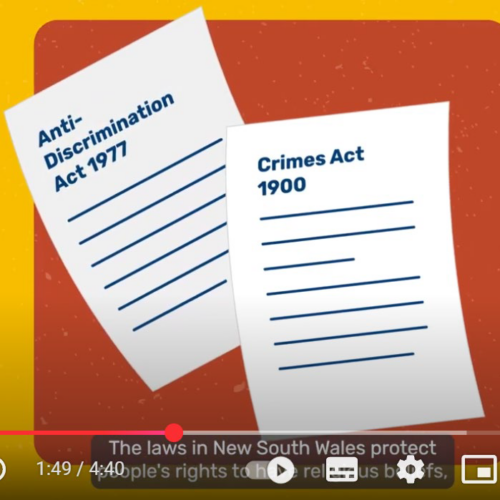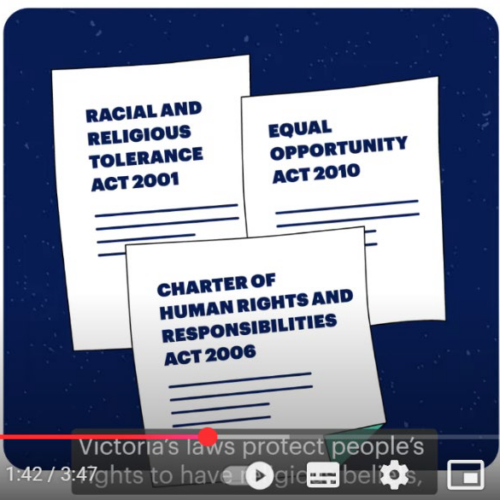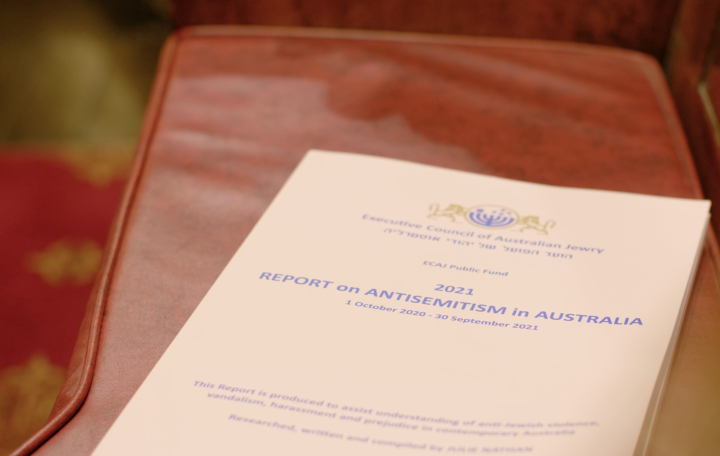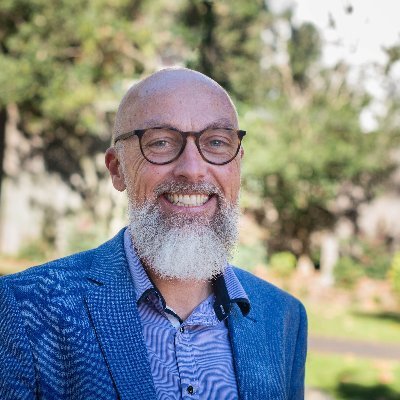NSW Conversion Practices Ban – ADNSW Advice
Anti-Discrimination NSW released a series of explanatory resources on the day the Act came into force: https://antidiscrimination.nsw.gov.au/discrimination/conversion-practices.html
These explanatory materials, taken as a whole, misrepresent the Act, because they fail to reflect the “appropriate balance between prohibiting LGBTQ+ conversion practices [and] respecting freedom of belief and expression” that the Attorney-General referred to in the Second Reading Speech.
These resources have cut-and-paste resources from other jurisdictions such as Victoria, without giving consideration to the significant differences between the two legislative regimes.
Errors in the Explainer video
There are three prominent errors in the explainer video:
1) The AD NSW explainer video replicates the video created by the Victoria Equal Opportunity and Human Rights Commission, with superficial editing. The following transcript shows in tracked changes the alterations made to one section (at about 0:35 in each video).
“In Victoria New South Wales, the Law says all people, regardless of sexual orientation or gender identity, should feel welcome and valued and are able to live authentically and with pride.”
The omission of the words “the Law says” is telling. The Victorian video at this point is quoting the Objects in clause 3 of the Victorian Act, and the representation in the video reflects this legal status – the words appear, clause by clause, on a sheaf of paper, accompanied by the sound of pages ruffling. The NSW Act has no equivalent Objects clause. But the representation in the video (clause by clause, on a sheaf of paper, with pages ruffling) is exactly the same, conveying the misleading impression that this statement also reflects the law in NSW.
2) A legal falsehood occurs in the NSW video at 1:45, which states “The laws in NSW protect people’s right to have religious beliefs”, and shows imagery depicting the Anti-Discrimination Act 1977 and the Crimes Act 1990, adapting the Victorian equivalents shown in the following screenshots:


However, the statement in the NSW video is simply wrong. Unlike in Victoria, NSW laws do not protect people’s rights to have a religious belief, because religious belief is not a protected attribute in the Anti-Discrimination Act 1977 (NSW). It is astounding that Anti-Discrimination NSW, the body with the statutory duty to administer the Anti-Discrimination Act 1977 (NSW), would produce a video with such a patently incorrect claim about its own Act.
3) At 2:30 in the NSW video, there is a new section with no parallel in the Victorian version. The video depicts of a Christian preacher, with the voice-over “It is not a conversion practice to state what a religion says about a particular topic”, correctly reflecting the exemption in subsection 3(4)(a). However, the video then adds the qualifier “providing it is not directed to changing or suppressing an individual’s sexual orientation or gender identity”. This is incorrect. The qualifier applies to 3(3)(c), and the examples in section 3(4) are expressed absolutely, without this qualifier.
Errors in the Frequently Asked Questions (FAQ)
Faith leaders have repeatedly asked Anti-Discrimination NSW for explanatory materials that would make clear both what is and is not a conversion practice. The materials provided fail to do this, and instead wrongly convey the impression that things are conversion practices when the Act explicitly says they are not:
1) The section in the FAQ headed “What are examples of conversion practices?” includes a link to a comic with the heading “CONVERSION PRACTICES IN AUSTRALIA”. The comic’s first purported example of a conversion practice is a depiction of a Christian minister in a pulpit saying “Being LGBTQA+ is a form of brokenness”. This is not a conversion practice in NSW, because religious teaching is specifically exempted in subsection 3(4)(a). The next purported example of a conversion practice depicts a LGBTQA+ individual overhearing a conversation that includes the words “I prayed for a lesbian to be healed from her past trauma”. This is also not a conversion practice, because the overhead conversation was not “directed to an individual”, as per the definition of a conversion practice in subsection 3(1). This comic should not be included in the FAQ, because it does not accurately reflect the law in NSW, and will lead people of faith to draw wrong conclusions about conversion practices.
2) The FAQ is also misleading in what it says about celibacy. The FAQ states:
General comments about celibacy and abstinence in broad statements of belief are not unlawful. However, telling a person in a same-sex relationship that they must stop being sexually active and become celibate could be regarded as suppressing a person’s sexuality and may be unlawful, depending on the circumstances. Similarly, telling an LGBTQA person that they should remain celibate and never marry or have a sexual relationship with a person of the same sex, could be regarded as suppressing a person’s sexuality and may be unlawful, depending on the circumstances.
Note that this explanation is qualified by the phrases “could be regarded as” and “may be unlawful, depending on the circumstances”. These phrases obscure the truth. In all but the most extreme cases, telling someone they should live according to Christian teaching about sexuality will not be a conversion practice. This is what the Attorney-General says in the Second Reading Speech:
“We have heard clearly that, especially with religious beliefs or principles, part of that expression can also include expressing that such beliefs should be applied to one’s life. The exclusion has been carefully drafted to preserve the ability for people to express their views and their beliefs. That includes the expression of a belief or principle about specific matters such as through a sermon or one-on-one conversations. For instance, explaining that a religious text states homosexuality is a sin would not be a conversion practice…. Some stakeholders queried whether certain requirements, such as for seminarians to be celibate, would be considered a suppression practice. Such rules are of a general nature, and they are not directed to an individual on the basis of their sexual orientation or gender identity, and so would not be a conversion practice” (emphasis added).
It is clear from the Second Reading Speech, and from the face of the legislation itself, that it is not a conversion practice to tell someone (for example) that Jesus calls on all his followers not to engage in sex outside marriage (i.e., ‘expressing a religious belief or principle’), and therefore that we should not act on our sexual desires if unmarried (i.e., ‘expressing that such beliefs should be applied to one’s life’). We have been given reassurances from the government that the Attorney-General’s explanation correctly reflects the intent of the legislation, and there is no intent to ban traditional teaching about celibacy and abstinence.
We understand that Anti-Discrimination NSW has been advised that their FAQ is not consistent with the Attorney-General’s Second Reading Speech and that they have declined to revise their explanatory materials.
3) The FAQ also states that “encouraging someone to believe their sexuality or gender is … disordered is a conversion practice”. The NSW Faith Affairs Council was invited to provide feedback to Anti-Discrimination NSW on proposed resources, and they advised ADNSW not to use the word “disorder” because of the potential to mislead. The Faith Affairs Council advised ADNSW as follows:
“Disorder” in popular usage means “mental disorder”. In Christian theology, it means something very different. St Augustine described our loves as “rightly ordered” when we love God above all and order our other loves in relation to that love (i.e., we love what God loves). Disordered love occurs when other loves – even love for that which is intrinsically good – displace our love for God and love other things as he has ordered it. According to Augustine, the essence of sin is disordered love, and this is the universal human condition. So, when a Christian says “we need to repent of disordered loves/desires”, they are making a statement about all humanity, not about LGBTIQ people in particular. All human sexuality can be disordered.
The exemption in section 3(4)(a) of the Act covers ‘stating relevant religious teachings’, which means that teaching someone about ‘disordered sexual desires’ is not a conversion practice. It is disappointing that the Anti-Discrimination NSW FAQ states that this is a conversion practice, notwithstanding clear advice to the contrary.
4) The FAQ, in answer to the question, “What if I participated willingly, asked for help or consented to the change or suppression attempts?”, inaccurately makes the blanket statement “Conversion practices are still unlawful even when a person seeks them out for themselves.” This is only partially true. Consent is no defence to the criminal offences in Part 3 of the Act – see subsections 5(4) and 6(2). However, these subsections do not apply to the Civil Scheme in Part 4 of the Act. This is another example of a failure to reflect a key difference between the NSW Act and the Victorian legislation (which embeds the issue of consent within the definition of a change or suppression practices – see subsection 5(1)).
Subsection 3(3)(b) of the NSW Act states that it is not a conversion practice to “genuinely facilitat[e] an individual’s coping skills, development or identity exploration to meet the individual’s needs”.
On 27 February 2023, the Premier gave a pre-election commitment that “an individual of their own consent seeking guidance through prayer will not be banned” under conversion practices legislation introduced by a Minns Labor government. This commitment was acknowledged in the Second Reading Speech:
“It will also not be illegal for an individual, of their own consent, to seek guidance through prayer. That exclusion is consistent with those positions. The bill does not impact a person’s ability, of their own consent, to seek counsel or guidance from within their faith. Counsel and guidance can still be given, provided they are not directed to change or suppress.”
The Second Reading Speech makes clear that this exemption is not limited to “affirming” support. An individual, of their own consent, can seek counsel or guidance from within their faith, including prayer, to live consistent with their faith.
Both this FAQ and other advice from Anti-Discrimination NSW is inconsistent with the Premier’s commitment and the Second Reading Speech. They were asked to comment on the hypothetical scenario of a married man, who tells a pastor that he loves his spouse and children but is experiencing some unwanted same-sex attraction and seeks prayer. Their advice is that praying for this man in response to his request would be a conversion practice. We should, however, rely on the undertakings of the Premier and Attorney General’s Second Reading Speech, and conclude that prayer in this context would not be a conversion practice.
5) Although it is not directly relevant to a ministry context, the FAQ misrepresents the scope of the health practitioner exemption.
The FAQ says:
What can health practitioners do?
Health practitioners can provide supportive, affirming care to members of the LGBTQA community across NSW. Practitioners need to act within legal, professional and ethical standards and exercise reasonable professional judgement when providing this care. (emphasis added)
The word “affirming” (bolded in the quote above) is misleading and has no basis in the legislation. The exemption in 3(3)(a) means that a health practitioner is not required to support and affirm a gender transition if it is not clinically appropriate in their reasonable judgment.
Errors throughout the Explainer Materials
The explainer materials consistently mis-apply the legislation to only LGBTIQ+ people.
The title of the Simple English booklet is “LGBTQA Conversion Practices”, and the booklet uses that phrase throughout, implying that the Act only protects LGBTQA people from conversion practices. For example, page 9 says “Conversion practices are used on LGBTQA people.”
Similarly, the communications toolkit use the phrase “LGBTQA Conversion Practices” 27 times across 20 slides, and makes the inaccurate statement “The Conversion Practices Ban Act 2024 … prohibits LGBTQA conversion practices in NSW. (emphasis added).
This is both unhelpful and inaccurate, because the Act is not limited to LGBTQA expressions of sexual orientation or gender identity. The Act applies equally to the change or suppression of heterosexual sexuality as it does to homosexual sexuality, for example.
This is not merely a pedantic quibble. It goes to the heart the operation of the Act, and demonstrates the flaws in the interpretation of the Act provided by Anti-Discrimination NSW. If Anti-Discrimination NSW is correct – that “telling an LGBTQA person that they should remain celibate and never marry or have a sexual relationship with a person of the same sex” is a conversion practice, then (as a matter of statutory interpretation, given the definition of ‘sexual orientation’) it is also true that telling a heterosexual person that they must not have a heterosexual sexual relationship outside of marriage is also a conversion practice. That is, teaching historic Christian teaching about marriage to heterosexuals is a conversion practice. That is patently not the intention of the Act. Trying to obscure this by pretending that the Act only applies to LGBTQA persons is unhelpful.
Clear bias in ADNSW
Religious communities in NSW should be able to rely on Anti-Discrimination NSW as an unbiased ‘umpire’ when it receives complaints about conversion practices. Indeed, the final section of the FAQ states:
“Anti-Discrimination NSW is impartial and does not take sides.”
However, if the explanatory materials are anything to go by, then we have every reason to question their impartiality. The explanatory materials do not in fact ‘explain’ the legislation because they provide no clarity on key issues for faith communities and instead create confusion with inaccurate and vague answers about what “could be” and “may be” a conversion practice, and otherwise misstate and misrepresent the effect of the Act.
We have brought these matters to the attention of the government, and Anti-Discrimination NSW at some length. Thus far, no corrections have been made. We will continue to engage with the government and Anti-Discrimination NSW to seek explanatory materials that properly reflect the Act.



